Quick Summary:
Managing offshore teams comes with its challenges and difficulties. To truly understand how to work with offshore teams, we have come up with best practices for managing offshore resources that will guide you through important aspects of setting up proper communication strategies, building synergy between on-shore and offshore teams, ensuring security, measuring and evaluating offshore team performance to get the most out of your offshore development team.
Offshore software development started as an alternative to hiring or outsourcing IT projects to dedicated development companies.
The rising costs of traditional hiring in countries such as the US, UK and Canada make it a difficult choice for SMEs. On the other hand, most business leaders and managers remain sceptical about outsourcing projects entirely to a third-party vendor for fear of losing management and control over the process.
An offshore development team cuts through the pain points of both these hiring models and offers a stable middle ground. Working with an offshore software development team, you can selectively outsource certain business processes and tasks to them while retaining core competencies and working for your on-site team. Besides, hiring offshore developers brings the biggest advantage of reduced labour costs. Hence, you can expand your team efficiently.
However, managing offshore teams isn’t a cakewalk. Effectively communicating, motivating, coordinating, and implementing a proper offshore team culture in this virtual, global workspace requires a lot of dedication, skills, and knowledge of best practices for managing offshore resources.
📝 In this blog, we’re going to discuss…
How to Solve the Pressing Challenges of Managing Offshore Development Teams
Working with an offshore development team is still a relatively newer concept than working with on-site development teams. Building a positive work culture, overseeing every employee and their behaviour, productivity and other traits, becomes easier when working at the same physical location. However, when this team is dispersed globally, you may feel overwhelmed about managing such a diverse, global team.
Here are some of the major concerns that most tech companies face when working with offshore software development teams:
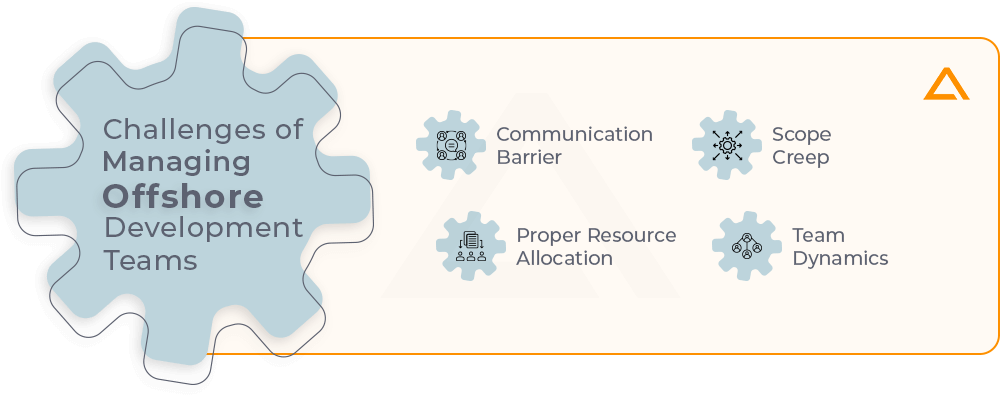
1. Communication Barrier
‘Communication is the key’ for any software development project, especially for managing offshore development teams. Managing communication with a dispersed team and conveying technical details to all stakeholders across various geographical locations presents unique challenges and threats.
- Team Communication: Managing offshore teams requires proper communication channels and hierarchy. Miscommunication can lead to misunderstandings and conflicts, which can delay the project’s timeline or impact its quality. Hence, to navigate such communication barriers, managers can implement regular video meetings, encourage open communication, and use effective collaboration tools to improve team connectivity.
- Stakeholder Communication: Working on offshore projects, there are chances of having multiple stakeholders, including non-technical individuals. By providing proper visual aids, concise project updates, and regular feedback sessions, you can fill the communication gap between the technical details and stakeholder’s understanding.
2. Scope Creep
Another common challenge with managing offshore engagements is the possibility of scope creep. Since there are time-zone barriers, it can limit the possibility or duration of real-time discussions, which could lead to unclear communication of expectations. Requirements could change drastically without the knowledge of offshore teams. Such situations can cause overtime, delays, cost overruns and outcome mismatches.
- Client Expectations: Aligning client expectations can be especially challenging in offshore projects due to the cultural and communication differences between the client and the offshore team. This could be in the form of a difference of perception or understanding of what project success indicates.
- Communication Styles: Offshore teams are generally expected to communicate with clients in English as a common language. However, the nuances in English proficiency between the client and the offshore software development team can lead to misinterpretations. The client’s perception of quality and progress can significantly change by improving the feedback system and confirming the deliverables.
- Change Management: No project works out as intended in the initial PRD – Project Requirement Document. As the software lifecycle goes through the different stages, some change requests will appear. Based on feasibility, practicality and other variables, this can be from the client’s or offshore dedicated development team Effective strategies must be implemented to manage such unforeseen changes to keep the offshore team’s morale up and ensure they can act on such requests.
3. Proper Resource Allocation
Allocating appropriately skilled resources to specific locations while considering your requirements and choosing between Nearshore vs Offshore options may or may not result in delayed project launches. Resource allocation will impact not only offshore developers but also how you allocate budget, technologies, and other related aspects.
- Human Resources: Offshore teams can encounter issues regarding the diversity of skills and potential mismatch between available talents and the project’s skill requirements. If working with a smaller offshore development team, you can conduct cross-training initiatives, skill matrix and resource planning and provide project-specific training to overcome such hurdles.
- Technology and Budget Resources: The success of any offshore software development project depends on how you navigate cost structures and technology availability. The variances in regional costs and technology accessibility can significantly impact the budget and resource allocation. Effective strategies must be implemented to ensure efficient tech adoption and optimized budget utilization.
4. Team Dynamics
Team dynamics is one of the most crucial things to get right when working with offshore teams. However, it is the most challenging one as well. Good team dynamics refers to the ability of individuals to communicate, empathise and respect each other for working in cohesion towards clients and the project’s success. This can be difficult to attain in a global dispersal setting, which is generally true when working with an offshore development team.
- Diversity Management: Cultural differences can easily lead to misunderstandings, hindering collaboration. Promoting cultural awareness, organizing team-building activities, and building a shared team identity to effectively manage diversity in offshore teams are very important.
- Cultural Differences: Your onshore and offshore teams might have contrasting cultural backgrounds, work practices and communication styles. If these differences are not understood, worked upon and discussed, it could lead to a disruptive team dynamic, which would negatively impact the project’s success and the company’s perception in the eye of the client.
Offshore Team Management: How to Manage an Offshore Development Team Effectively
Now that we have oversight of why offshore development teams can benefit your project and the various pressing challenges you need to be careful about when managing an offshore dedicated development team, we should look at some of the best practices towards offshore team management. Let’s get right into it:
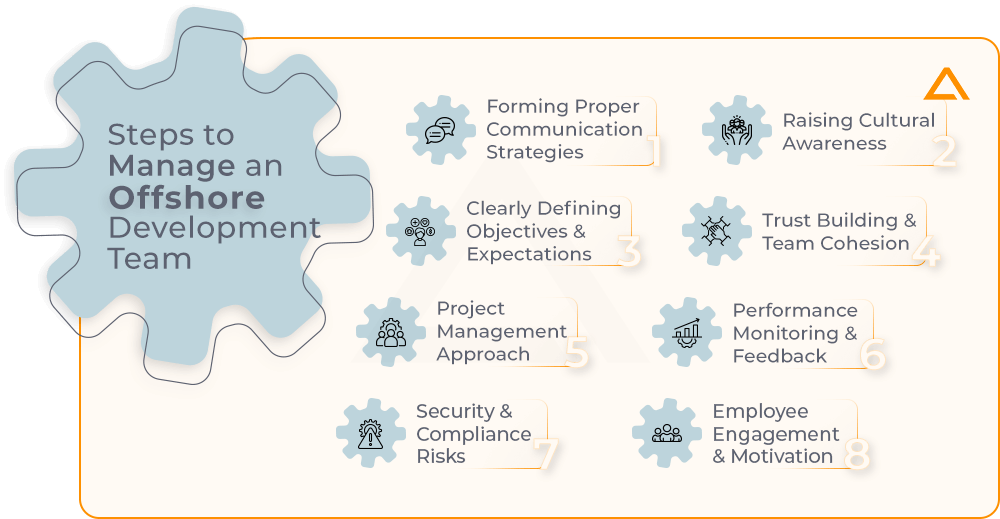
- Forming Proper Communication Strategies
Establishing Effective Communication Strategies
Effective communication strategies must be implemented to facilitate seamless interaction between onshore and offshore teams. This can be done with the help of video conferencing platforms, messaging platforms, and effective project management tools. Also, you must set proper communication protocols to ensure clarity and consistency in information exchange channels.
Conduct Regular Onshore and Offshore Team Meetings
Another important aspect that needs to be considered is overcoming the challenges of geographical distances that call for intentional efforts to connect regularly. Hence, scheduling virtual meetings that accommodate different time zones and creating a forum for team alignment, progress updates, and issue resolutions is paramount for managing software teams onshore and offshore.
Build Habit of Documentation and Knowledge Sharing
Beyond any real-time communication, your team should also have a habit of documenting all the development progress and establishing knowledge-sharing practices for cultivating a continuous learning work environment. A centralized repository for project documents and a knowledge base provide a foundation for transparency and long-term project sustainability.
- Raising Cultural Awareness
In a global team setting, cultural awareness and acceptance are essential for establishing proper collaboration between teams, clients and management. The team members must acknowledge and embrace diverse cultural backgrounds to enrich team dynamics and build a more inclusive work environment.
Cultural Training
Fostering cultural awareness with proper training resources should be imperative in your global work culture. Conducting such team-building sessions goes beyond the surface-level differences, helping team members understand the cultural nuances that can impact communication, decision-making, and collaboration efforts.
Team Building Activities
Cultural understanding cannot be just perceived through knowledge. It also needs to be built on shared experiences, incorporating team-building activities that celebrate diversity and promote unity and shared purpose within the team.
- Clearly Defining Objectives and Expectations
The success of any offshore project is majorly dependent on the clarity of the project’s goals and the alignment of the team members towards those objectives. Ensuring project goals are clearly understood and ensuring their alignment with the offshore dedicated development team creates the roadmap for project success.
Define Project Goals
The success of any project can only be determined if those success metrics are clearly defined. These goals are supposed to be the guiding principles that provide the development team with a shared vision and a sense of purpose and direction.
Alignment with Organization Objectives
The project goals should always align with the organization’s long-term objectives. This would ensure that the offshore team’s contribution also impacts the company’s goals.
- Trust Building and Team Cohesion
Trust is the most essential aspect of any effective teamwork. Managing offshore teams can be much easier if the team can trust each other and work together towards a common goal. Doing so requires an intentional effort to recognize and appreciate individual contributions and create an environment that encourages teamwork and accountability for others.
Talent Recognition and Appreciation
When a talent performs well and shows their knack in a certain aspect of their role, it is your job as a manager to identify and acknowledge it. This acknowledgement should go beyond individual contribution and focus more on the team’s collective strength.
Mentor-Buddy System
Building trust and cohesion with a virtual team requires developing meaningful connections professionally and intermediaries. One popular way of doing this is building a mentor-buddy system to pair team members to promote professional development and knowledge exchange and create a supportive environment.
- Project Management Approach
A well-defined project management approach is the base for efficient project execution. Choosing the right methodologies and knowing the best practices to implement them in a way that aligns with the collaborative nature of onshore-offshore development is crucial for managing offshore development teams efficiently.
Agile Development with Offshore Team
Agile development is one of the most practical and widely accepted management approaches for managing software teams. Moreover, it fits the agile nature of onshore-offshore team dynamics and collaboration needs. Shifting the focus on adaptability, iterative development, and continuous communication framework for successful project management is formed.
Defining Milestones and KPIs
Defining milestones is necessary to track performance, align timelines, and focus on overall project deliverables. You can also add key performance indicators for establishing a roadmap for success. Key Performance Indicators help assess how their contributions benefit the development process and give them proper structure. Also, assessing performance against these milestones provides a clear vision of how on track the project is and what needs to be changed.
Setting CI/CD Pipelines
About onshore-offshore collaboration, continuous integration and deployment practices help ensure a cohesive development pipeline for minimizing errors and enhancing collaboration.

Searching for IT Superstars?
We’re the AugMENTIONED Ones! 👀🌟”
Aglowid offers you a pool of skilled & dedicated remote developers to elevate your projects!
- Performance Monitoring and Feedback
Monitoring team performance and providing constructive feedback are crucial aspects of offshore team management. You should conduct regular check-ins and performance assessments that help contribute to individual growth and team success.
Check-ins with Dedicated Development Teams
Schedule regular check-ins with the offshore development teams and onshore development teams as well. Such one-on-one sessions help facilitate a deeper understanding of individual challenges and achievements. This helps create a supportive work environment.
Setting Performance Metrics
Having a clear sense of defined performance metrics helps align the teams’ efforts with project objectives. Regular evaluation against such metrics provides proper feedback but also encourages a work culture of continuous improvement and accountability.
- Security and Compliance Risks
Security and compliance are two major challenges of managing offshore teams. While working with remote development teams, you must have proper provisions and assurance about the security and compliance aspects of the project data, structure, vision, and everything else. Legal compliances, whichever is applicable, should also be implemented to safeguard the project’s integrity.
Setting Proper Security Measures
The foundation of any secure offshore team management effort is its implementation of robust data security measures. You must ensure the security to Mitigate Security Risks in Offshore Development, confidentiality, integrity and availability of sensitive data while adhering to legal regulations and industry-specific compliances.
Legal Compliances
Legal compliances are complex terrains that must be ventured on, understood and complied with to sustain the success of virtual teams. Your team should know the data protection regulations, conduct regular compliance testing and maintain proper documentation for upholding legal standards.
- Employee Engagement and Motivation
Last but not least, you must keep your employees motivated when managing offshore development teams. Motivation can act as a catalyst for innovation and productivity in a global team setting. To nurture a high-performing team, focus on promoting a work culture that promotes professional growth, inclusive decision-making, and collaborative engagement.
Providing Professional Development Opportunities
Investing in the professional development of your offshore team members is not just an investment towards their personal growth but also the team’s collective success. When you provide training programs, quizzes, educational reimbursement, mentorship initiatives and other non-monetary benefits, you showcase your commitment towards cultivating your employees’ skills and professional growth.
Inclusive Decision Making
An inclusive decision-making culture is the greatest strength behind successful offshore team dynamics. Implement a transparent feedback system, collaborative decision workshops and other such practices that allow every team member to raise their points toward the decision-making process.
Benefits of working with Aglowid’s Offshore Software Development Team
Aglowid is a trusted offshore development centre for many clients to build an offshore team in India. We know how important it is to provide a wide range of experienced and skilled remote developers to match our client’s project requirements.
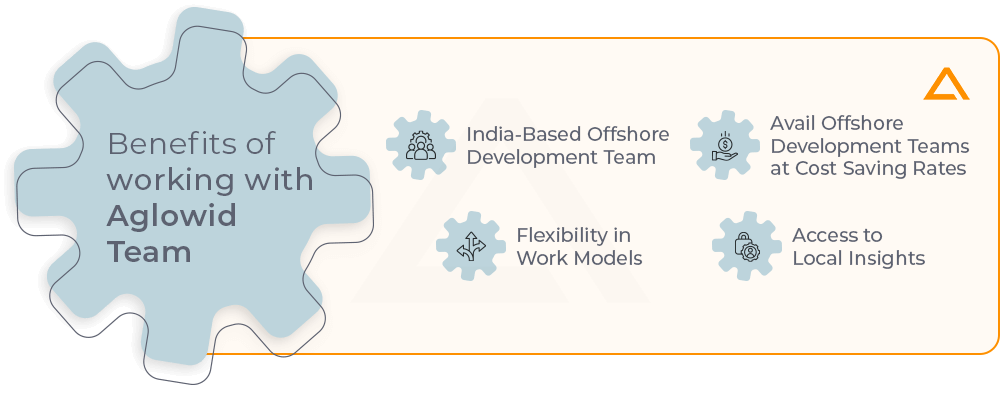
With a team of 50+ dedicated developers with expertise in domains such as web development, mobile app development, IoT, AI/ML, cloud integrations and other cognitive technologies, we bring credible talent. We also understand the flexibility needed for building a custom dev team, and hence, here are the many benefits you will get if you choose us as your offshore development team partners –
India-Based Offshore Development Team
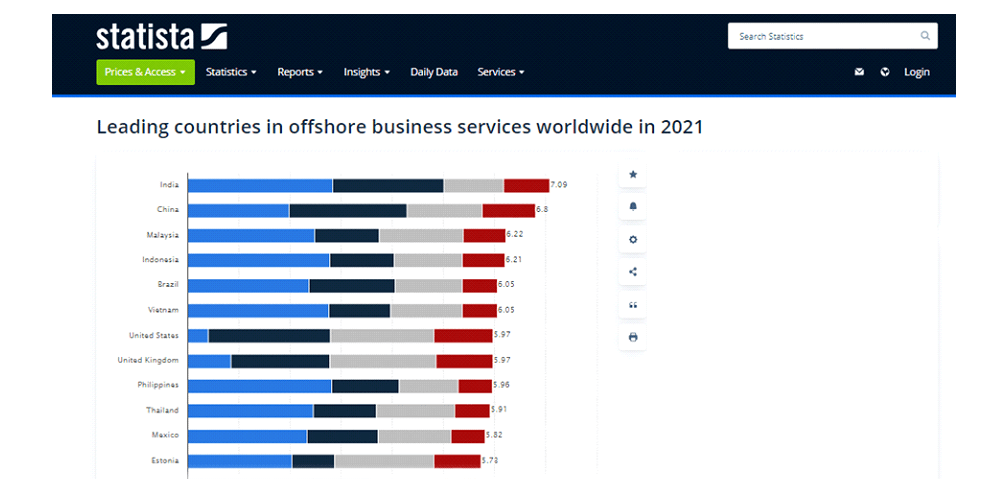
According to this study conducted by Statista, India is the most popular offshore location for building offshore teams. When you build your offshore team in India, you benefit from cheaper labour costs and more employees available in each domain. Not only that but their expertise and experience match that of any professional developer back in your hometown. You can hire an offshore development team at very reasonable rates by working with an offshore development company in India.
Flexibility in Work Models
We provide two remote developer team hiring models – the contractor ODC model and the customer ODC model.
- Contractor ODC Model – If you have a specific project or aspect of a project that you don’t want to spend your on-site resources on, our team of dedicated developers will take care of the entire project’s SDLC by ourselves so your core team can focus on your core competencies.
- Customer ODC Model – If you don’t have a technical team and want to build a dedicated offshore team in India, you can directly assess our skilled and certified team of offshore developers, who will work under your guidance and instructions.
Range of Outsource Talents and Teams Aglowid Offers
Since we are a managed IT company, we have a pool of talented and diverse employees in most of the leading technologies and domains. When you build your offshore development team with Aglowid, you get access to dedicated teams like:
- Offshore Software Development Team
- Offshore Hybrid Mobile Development team
- Offshore Web Development Team
- Offshore Ecommerce Team
- Offshore CMS Team
- Offshore AI/ML Team
- Offshore Cloud Architects
Avail Offshore Development Teams at Cost Saving Rates
We keep our prices simple, fair and lucrative. You can get the best value for your buck by setting up your offshore development team with us. All you need to do is email us at [email protected] with your project requirements, and we will take care of the rest! Moreover, we also provide flexible engagement models – fixed, part-time and hourly.
Access to Local Insights
One of the bigger benefits of setting up an ODC comes from the cultural insights you know about a country where you are hiring offshore talents. And guess what? India is a very lucrative and promising market! We can point you in the right direction and teach you about our cultural nuances to help you expand your business in India.
Wrapping Up!
This is your ultimate guide on managing offshore teams that navigate the intricacies of management challenges you are likely to experience and their effective workarounds. We also covered some best practices for covering every technical and non-technical aspect of working with a remote development team. If you have any further queries, you can leverage our IT strategy and consultation services to get a custom roadmap for your project.
FAQs
- Forming Proper Communication Strategies
- Raising Cultural Awareness
- Clearly Defining Objectives and Expectations
- Trust Building and Team Cohesion
- Project Management Approach
- Performance Monitoring and Feedback
- Security and Compliance Risks
- Employee Engagement and Motivation
- Real - Time Communication:
- Tools - Slack, Microsoft Teams, Zoom
- Strategies – Scheduled Meetings, Instant Messaging
- Asynchronous Communication:
- Tools – Outlook, Gmail, Jira, Asana, SharePoint
- Strategies – Documentation, Email Updates, Commenting Features
- Video Conferencing:
- Tools – Zoom, Google Meet, Microsoft Teams
- Strategies – Regular Team Calls, Client Meetings
- Task Management :
- Tools – Jira, Asana, Trello
- Strategies – Task Assignment, Progress Tracking
- File sharing and Collaboration :
- Tools – Google Drive, Dropbox, Microsoft OneDrive
- Strategies – Centralized document repository, collaborative editing



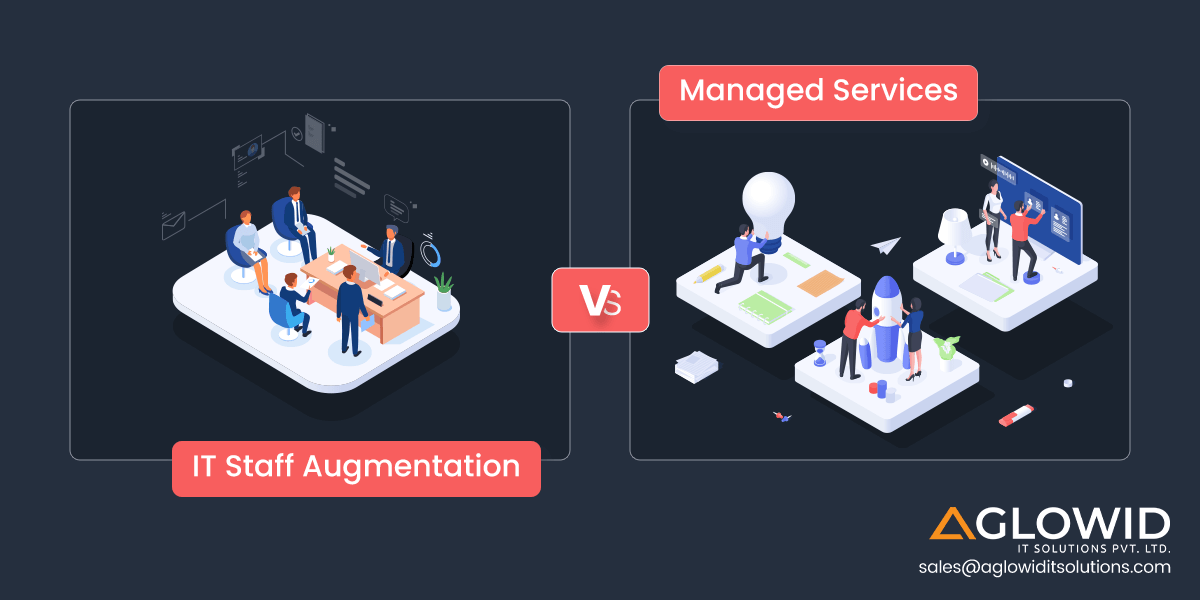

 Say
Say